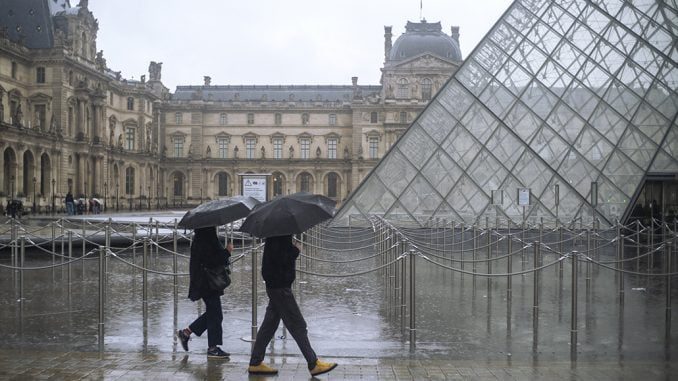
PARIS — The spreading coronavirus epidemic shut down France’s Louvre Museum on Sunday, with workers who guard its famous trove of artworks fearful of being contaminated by the museum’s flow of tourists from around the world.
Almost three-quarters of the Louvre’s 9.6 million visitors last year came from abroad. The world’s most popular museum welcomes tens of thousands of fans daily in Paris.
“We are very worried because we have visitors from everywhere,” said Andre Sacristin, a Louvre employee and union representative.
“The risk is very, very, very great,” he said in a phone interview. While there are no known virus infections among the museum’s 2,300 workers, “it’s only a question of time,” he said.
A short statement from the Louvre said a staff meeting about virus prevention efforts stopped the museum from opening as scheduled Sunday morning. Would-be visitors were still waiting Sunday afternoon to get inside but the Louvre later announced it would not open at all on Sunday.
Among the frustrated visitors was Charles Lim from Singapore. He and his wife, Jeanette, chose Paris to celebrate their first wedding anniversary and bought tickets in advance for the Louvre, home to the “Mona Lisa” and other famous artworks. He posted a video on Twitter of the long lines of people waiting to get in.

“We waited for about 3 hours before giving up,” he told The Associated Press. “It was incredibly disappointing.”
The shutdown followed a French government decision Saturday to ban indoor public gatherings of more than 5,000 people.
Sacristin said the new measure exacerbated the fears of Louvre workers that they might be in danger of contamination. Louvre staffers were also concerned about museum workers from northern Italy who had come to the museum to collect works by Leonardo da Vinci that were loaned for a major exhibition, he said.
Italy, with over 1,100 coronavirus cases and 29 deaths, has been the epicenter of the outbreak in Europe.
Another meeting about virus prevention at the Louvre is scheduled for Monday between union representatives and the museum management.
Sacristin, who will be taking part, said museum visitors should be subjected to health checks to protect staffers and if any cases of coronavirus contamination are confirmed “then the museum should be closed.”
Workers have asked for masks to be distributed but so far have been given only an alcohol-based solution to disinfect their hands, he said.
“That didn’t please us at all,” he said.


